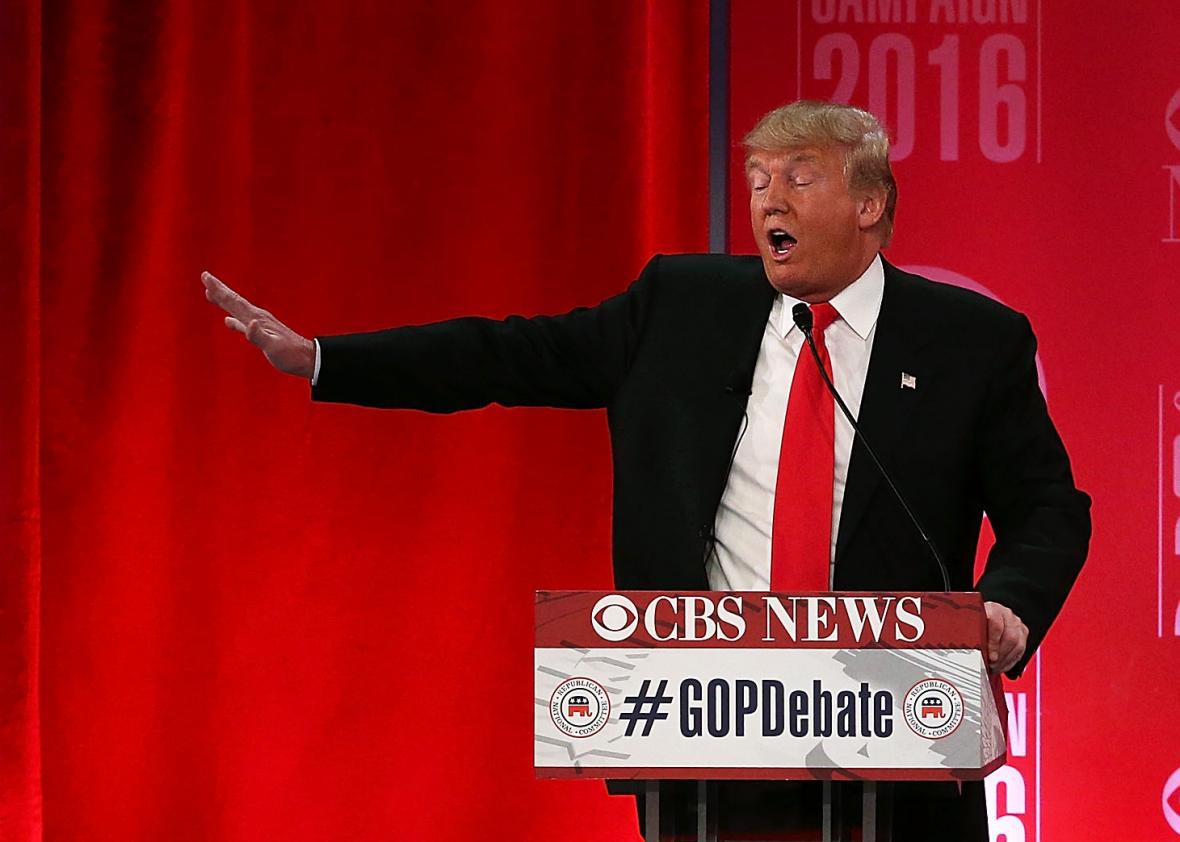If you watched Thursday’s Democratic presidential debate, you saw a calm, wonky, and civil discussion between two presidential candidates. If you watched Saturday’s Republican debate, you saw the opposite. You saw a brawl. And the instigator—the man who turned a debate about leading the country into a cage match—was Donald Trump.
Trump had a single strategy for the night: Attack, attack, and attack. Early in the debate, he blasted Jeb Bush for his national security plans, specifically criticizing how Bush would go about fighting both ISIS and the Syrian regime. “You can’t fight two wars at one time. You listen to him, and you listen to some of the folks that I’ve been listening to—that’s why we’ve been in the Middle East for 15 years, and we haven’t won anything,” he said, the first of many jabs at the former Florida governor. But Trump went beyond this. He used these attacks on Jeb to litigate the presidency of his brother.
“The war in Iraq, we spent $2 trillion, thousands of lives, we don’t even have it,” Trump said. He continued: “George Bush made a mistake. We can make mistakes. But that one was a beauty. We should have never been in Iraq. We have destabilized the Middle East.”
To millions of American voters—independents, Democrats, and even Republicans—this is true. The majority of Americans think the Iraq war was a bad decision and, until recently, gave low ratings to George W. Bush. Trump was speaking to them. Unfortunately for the real estate magnate, this isn’t the general election. He still needs to win the Republican nomination, and Republicans still favor the Iraq war and President Bush.
Which is why Republicans onstage went to bat for the former president, defending his tenure against Trump’s charge that President Bush failed to keep the country safe. “The World Trade Center came down during your brother’s reign, remember that,” responded Trump to one of Jeb’s defenses of the previous president’s security record. When Marco Rubio had a chance to speak, he pushed back. “I just want to say, at least on behalf of me and my family, I thank God all the time it was George W. Bush in the White House on 9/11 and not Al Gore,” he said.
This was the pattern for the night. Trump would attack, with reckless swings at everyone on stage (but especially Jeb Bush), and his targets would attempt to push back, all arguing on his terms. Bolstering this free for all was the audience, which clapped, and booed, and encouraged the pitched battle between the remaining candidates.
“You are single biggest liar,” said Trump in a heated exchange with Texas Sen. Ted Cruz. “This guy will say anything, nasty guy. Now I know why he doesn’t have one endorsement from any of his colleagues.” In turn, Cruz replied by trying to hit Trump on his past positions and rhetoric. And while the crowd backed Cruz, the fact of the matter is that Trump’s voters love his aggression. His attacks are part of the appeal. Cruz, Bush, and others have to engage Trump—lest they look weak—but doing so lets Trump stay in his element.
If you were watching the Republican debate to get a read on policy and plans, you were disappointed. The entire occasion—all two hours—were consumed by this death match of a presidential debate. With that said, this night of combat wasn’t a waste. No, it didn’t illuminate anything about the candidates, but it did tell us something about the Republican Party. Even now, as it fights to win a term in the White House, the GOP is unwilling to deal with the legacy of the Bush administration. For everyone but Trump, there is nothing to apologize for and nothing to change. Bush, in their view, took the right steps.
This is where Trump has an advantage. His Bush-bashing may fall short with conservative Republicans, but more moderate Republicans—and even conservative independents—might back Trump’s take on the Iraq war and the legacy of George W. Bush. Indeed, if he wins the nomination, Trump’s vocal disagreement with Republican orthodoxy on Iraq will stand as an asset, not a liability.
For all of his anger and vulgarity, Trump understands what the GOP (as an institution) doesn’t. Americans may want a Republican in November, but they don’t want a return to the Bush years. The party doesn’t want Trump’s “common sense conservatism” on these issues, but it might be what it needs.
See more of Slate’s coverage of the GOP presidential primary.
